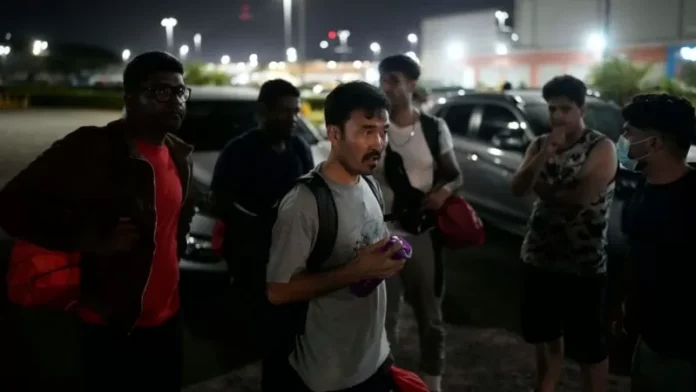Panama City — After weeks of legal battles and human rights criticism, Panama has finally released dozens of migrants who were held for weeks in a remote camp after being deported from the United States. The Panamanian government has given them 30 days to leave the country, thrusting many like Hayatullah Omagh, a 29-year-old who fled Afghanistan in 2022 after the Taliban took control, into a state of uncertainty and fear.
Omagh, along with 65 other migrants from China, Russia, Pakistan, Afghanistan, Iran, Nepal and other nations, arrived in Panama City after spending weeks detained in poor conditions by the Panamanian government. In an interview with the Associated Press, Omagh expressed his concerns about his future, saying, “We are refugees. We do not have money. We cannot afford a hotel in Panama City, we do not have relatives. I can’t go back to Afghanistan under any circumstances. It is under the control of the Taliban, and they want to kill me. How can I go back?”
While the Panamanian authorities have stated that the deportees will have the option to extend their stay by 60 days if needed, many like Omagh are unsure of what they will do after that. With limited resources and no support system in Panama, they are left in a state of limbo, unsure of their next steps.
The release of these migrants has been a result of a deal struck between the Trump administration and Panama and Costa Rica, as the U.S. government attempts to speed up deportations. Under this agreement, hundreds of people, including families with children, were sent to the two Central American countries as a stopover while authorities organized a way to send them back to their countries of origin.
However, this move has been met with criticism from human rights groups and lawyers advocating for the migrants. They have raised concerns about the treatment of the deportees and the violation of their rights. The situation became even more alarming when hundreds of deportees, detained in a hotel in Panama City, held up notes to their windows pleading for help and expressing their fear of returning to their own countries.
Under international refugee law, people have the right to apply for asylum when they are fleeing conflict or persecution. However, the deportees were not given this opportunity and were instead sent to a remote camp near Panama’s border with Colombia. Here, they spent weeks in poor conditions, were stripped of their phones, denied access to legal counsel, and were not informed about their next destination.
Lawyers and human rights defenders have raised concerns about Panama and Costa Rica becoming “black holes” for deportees, and have accused the Panamanian authorities of trying to wash their hands of the situation amid mounting human rights criticism. Upon their release on Saturday night, human rights lawyers identified at least three people who required immediate medical attention. One had been vomiting for over a week, another had diabetes and had not received insulin in the camp, and a third person had HIV and did not have access to medication while in detention.
The release of these migrants has brought some relief, but it has also highlighted the dire situation they are in. Many of them, like Omagh, cannot return to their home countries due to various reasons. Omagh, an atheist and a member of an ethnic minority group in Afghanistan known as the Hazara, said that returning home under the rule of the Taliban would mean certain death for him. He had tried to live in Pakistan, Iran, and other countries for years, but was denied visas.
Omagh was deported after presenting himself to American authorities and asking to seek asylum in the U.S., which was denied. He said, “My hope was freedom. Just freedom. They didn’t give me the chance. I asked many times to speak to an asylum officer, and they told me ‘No, no, no, no, no.'”
The conditions in the camp were also a cause for concern for the deportees. Omagh and others shared stories of scarce food, sweltering heat with little relief, and aggressive Panamanian authorities. In one instance, a Chinese man went on a week-long hunger strike, while in another, a small riot broke out when a guard refused to return a migrant’s phone. The riot was suppressed by armed guards.
Panamanian authorities have denied these accusations about the camp conditions, but have also blocked journalists from accessing the camp and canceled a planned press visit last week

